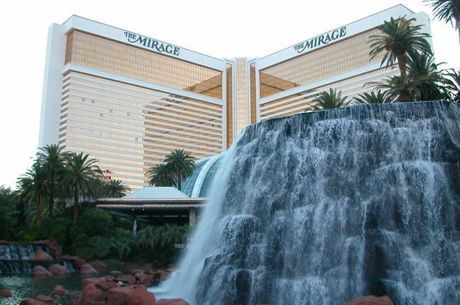Inside Gaming: NJ Revenue Down in March, Online Growth Continues

This week's Inside Gaming starts with yesterday's revenue report from New Jersey from which the continued growth of online gaming revenue earns notice, shares news of an industry giant stepping down from his post in Macau, reports on a possible deal in the making concerning a new Massachusetts property, and tells of Connecticut legislators' current hesitancy over a possible change to existing laws regarding casinos in the state.
New Jersey Down for Month, Online Gaming Increases Again
Yesterday the New Jersey Division of Gaming Enforcement released its monthly revenue report, showing an overall revenue decrease of 1.5 percent for the month when compared to March 2017. However, the slip was mitigated by the state's ever-burgeoning online gaming revenue, up once again a considerable 17.6 percent in March.
The total gaming win for the state's seven casinos was $218.5 million, down from the $221.9 million from a year ago. The internet gaming win comprised almost $25.6 million of that total, up from $21.7 million in March 2017 and a new record-high since New Jersey launched online gaming in November 2013.
It was the seventh-straight month the internet gaming win has increased, and the 13th-straight month the total has topped $20M.
As usual, the Borgata was the highest total earner at almost $64.9 million, a gain of 0.9 percent year-over-year. The Golden Nugget enjoyed the largest increase, with its $28.1 million overall gaming win representing a 23.8 percent boost.
Also, the Golden Nugget's internet gaming win of $8.65 million, a better than 40 percent increase from 2017, was roughly twice the size of nearest competitors Borgata, Caesars Interactive NJ, and Resorts Digital.
Casino Control Commission Chairman James Plousis pointed to the abnormally harsh weather during the month as having possibly affected casinos' business, The Press of Atlantic City reports.
"I don't know what impact the weather had, but four nor'easters in March sure didn't help Atlantic City casinos," said Plousis.
Macau Gambling Giant Stanley Ho Steps Down as SJM Chairman
Macau's most long-lasting and prominent player, Stanley Ho, announced this week his intention to step down from his position as chairman of SJM Holdings, the South China Morning Post reports.
The 96-year-old Ho will formally retire at the company's June meeting, though will continue as chairman emeritus while his daughter, Daisy Ho, takes over as chairman.
In its statement regarding the move, SJM Holdings described Ho as "the founding father of Macau's gaming industry," a designation often echoed by industry observers who over the years have dubbed him either "the King of Gambling" and "the Godfather of Gambling" in the region.
In 1962 Ho and his partners were able to win control of what was then the Portuguese government-run gambling monopoly in Macau, and soon after established the Sociedade de Turismo e Diversoes de Macau and Shun Tak Holdings. Over the next four decades Ho's business empire grew to the point he was thought to control over half of Macau's economy.
SJM Holdings currently owns 19 casinos in Macau, among them the Casino Lisboa. Ho is said to have fathered 17 children by multiple partners, and many members of Ho's large family are involved in Macau's gaming industry, including his son Lawrence Ho who is chairman and CEO of rival Melco International.
WSJ: Wynn Resorts in Talks with MGM Over Boston Property
Yesterday The Wall Street Journal reported that Wynn Resorts has entered into talks with MGM Resorts International regarding the possible sale of its partially built Wynn Boston Harbor property in Everett, Massachusetts.
Construction of Wynn Boston Harbor began in the summer of 2016, with approval for the design of the massive, 3.3 million-square-foot facility approved shortly thereafter by the Massachusetts Gaming Commission.
However following Steve Wynn's resignation as Chairman and CEO from Wynn Resorts in February, those same Massachusetts regulators are reportedly now reconsidering the company's casino license. Wynn has asked to withdraw his name from the license, and as Bloomberg reports the MGC has said they will "decide, possibly in the first week of May, whether to honor Wynn's request."
Wynn Resorts has estimated the total cost of the project at $2.5 billion, "making it one of the largest U.S. casino projects ever undertaken outside Las Vegas."
While those in the know suggest talks "are at an early stage and may not result in a deal," if MGM were to acquire the property it would then need to negotiate current regulations "since Massachusetts forbids companies from operating more than one casino in the state," and MGM Springfield is currently scheduled to open in September of this year.
Connecticut Lawmakers Hesitant Regarding New Casino Bill
Finally �� and while we're on the subject of MGM's plans and prospects in New England �� The Connecticut Post reported on Tuesday that the state's General Assembly is lukewarm at best toward the idea of passing any sort of casino bill during the current session.
What lawmakers decide will be of interest to MGM Resorts International who last September announced a plan to build a new $700 million casino in the state, MGM Bridgeport. That intention was announced despite the fact that Connecticut law currently allows only the state's two federally recognized tribes, the Mashantucket Pequots and Mohegans, to build a new gaming facility �� something the tribes are currently pursuing, in fact, in East Windsor.
According to State Speaker of the House Joe Aresimowicz, "dueling reports... talking about the fiscal viability of a casino in Bridgeport" have left legislators uncertain, leading him to doubt "we are going to finish anything up this session" as far as passing legislation is concerned.
The fast-changing landscape of gambling availablity in the region has affected the debate. Proponents of allowing MGM to build �� and MGM �� are "arguing a casino compact with Connecticut tribes [has been] rendered obsolete by the specter of urban casinos, sports betting, online betting and more."
"Still, worries about violating an agreement with Connecticut tribes �� who run Mohegan Sun and Foxwoods �� and losing millions in state revenue each year has made some legislators hesitant to pursue open bidding," explains The Connecticut Post.
Photo: "Money maketh Man," Symphoney Symphoney, CC BY 2.0.









